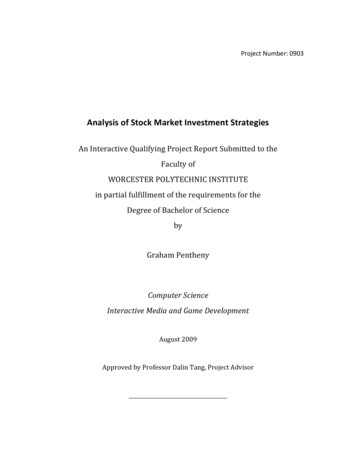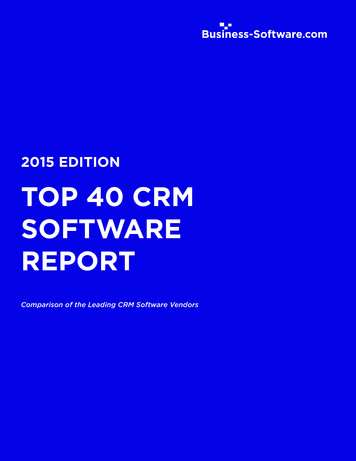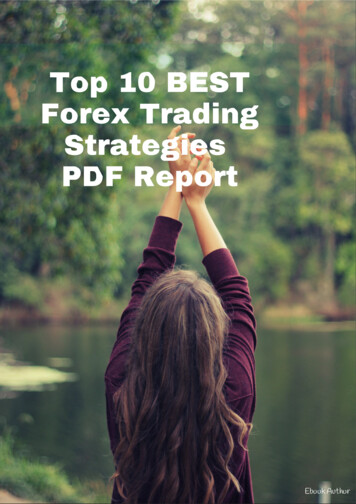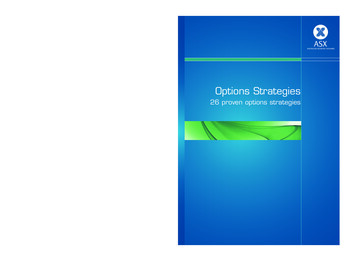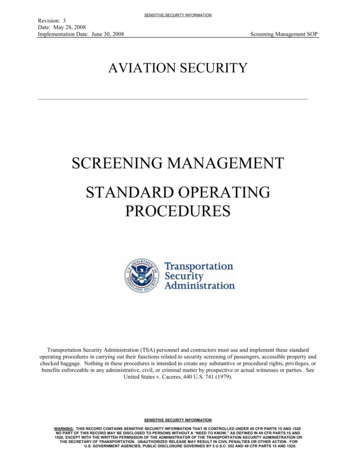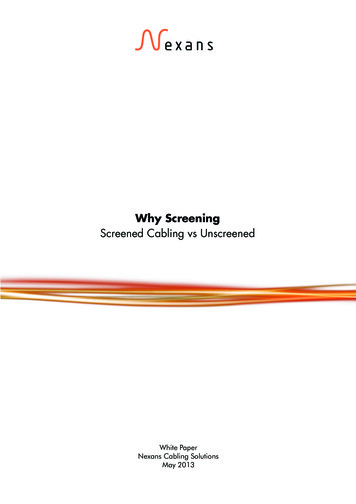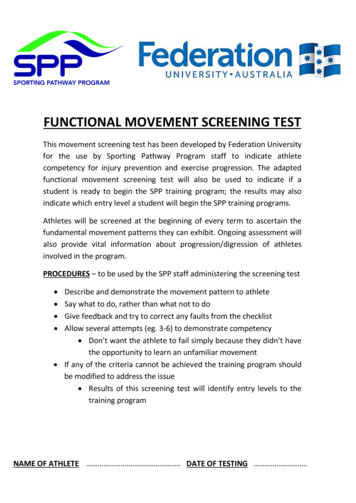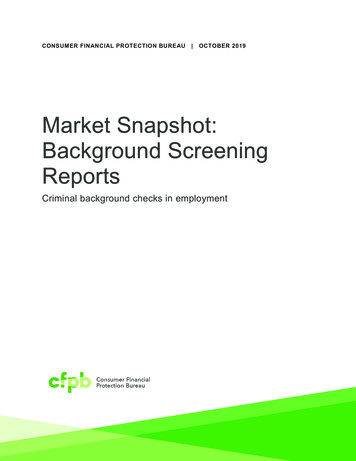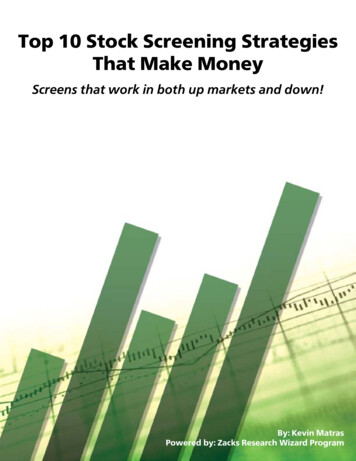
Transcription
Top 10 Stock Screening StrategiesThat Make MoneyScreens that work in both up markets and down!By: Kevin MatrasPowered by: Zacks Research Wizard Program
Table of ContentsIntroduction. iiThe Importance of Screening and Backtesting. iiiTrading the Strategies and Calculating Performance. viScreen 1:Filtered Zacks Rank 5 -- Tips on Trading the Zacks Rank.7Screen 2:Big Money Zacks. 10Screen 3:Small-Cap Growth. 13Screen 4:Return on Equity 2 (ROE 2). 17Screen 5:TA and FA Winners. 20Screen 6:New Highs. 24Screen 7:R-Squared EPS Growth. 28Screen 8:Value Method 1. 32Screen 9:Momentum Method 1. 35Screen 10:Growth & Income Winners. 38Additional Comments on Backtesting. 42You Can Do It!. 44iZacks Investment Research, Inc. Research Wizard http:www.zacksrw.com
IntroductionThe screens that I go over in this booklet are just some of thescreens that we’ve published in our ‘Screen of the Week’ articles,or that I’ve written about in my book ‘Finding #1 Stocks’.Some of these screens are proven profitable trading strategiesthat I created and backtested with the Research Wizard.And others are simply unique ways to screen for winning stocks.(In fact, some of these screens shatter common myths onevaluating stocks, complete with eye-opening statistics.)There are also other screens that didn‘t make it into this booklet,for no other reason, other than we wanted to keep this guideshort and to the point. (It’s “not meant to be an encyclopedia ofscreens”, I was reminded.) Plus, we didn’t want to give all of oursecrets away at once.But the screens presented here (and the ones we left out) areALL available in the Research Wizard program.So please read on and learn how you can pick better stocks thatmake more money, now!Kevin MatrasZacks Investment Research, Inc.Zacks Investment Research, Inc. Research Wizard http:www.zacksrw.comii
The Importance of Screeningand BacktestingWhy Should I Use a Stock Screener?The short answer is:“Because there’s over 10,000 stocks out there and you need a way to find the good ones”.The longer answer is:Other than buying the stocks that are talkedabout on TV, written about in the paper, ortouted on the internet (not to mention ‘tips’from a friend), how else are you going tofind stocks that meet certain fundamentalcharacteristics?Even if you don’t use a screener now, mostpeople still do their own ‘screening’ one wayor another. They may hear that a stock has acertain Growth Rate, or a certain P/E Ratio,or Sales Surprise. They then find themselveslistening for or reading about stocks that meetcertain criteria. just because younarrow down 10,000stocks to only a handful,doesn’t necessarily meanthat you’ve picked the beststocks on the planet.You might have pickedthe worst ones.Well, if you want to find stocks that meet certaincriteria, you can find them quickly and easilywith a stock screener.But, just because you narrow down 10,000 stocks to only a handful, doesn’t necessarily mean thatyou’ve picked the best stocks on the planet.You might have picked the worst ones.But how will you know?Backtesting!Once you’ve created a screen, you can then backtest it to see how good (or bad)your screening strategy has performed.In other words, does your screen generally find stocks that go up once they’ve been identified, ordoes your screen generally find stocks that get buried once they’ve been identified?iiiZacks Investment Research, Inc. Research Wizard http:www.zacksrw.com
The Importance of Screening and Backtesting continued.This is good stuff to know.With backtesting, you can see how successful your stock picking strategy has performed in thepast, so you’ll have a better idea as to what your probability of success will be now and in thefuture.Of course, past performance is no guarantee of future results, but what else do you have to go by?Think about it; if you saw that a stock picking strategy did nothing but lose money, year afteryear, period after period, stock after stock, over and over again (you get the point), there’s NOWAY you’d want to trade that strategy or use that screen to pick stocks with.Why?Because it’s ‘proven’ that it picks bad stocks.Sure, it may turn around and start picking winners, but it may also continue to pick losingstocks the way it always has.One the other hand;. what if you saw a strategy that did great year after year, period after period (you knowwhere this is headed), you’d of course would want to trade that strategy.Why?Because it’s proven to be a profitable trading strategy.And while it may start picking losers all of a sudden (now that you’re using it J), it may alsocontinue to pick winning stocks, just like it had been doing over and over before.Keep in mind, a screening and backtesting program isn’t a ‘box of magic’.But it’s a great way to see what works and what doesn’t BEFORE you put your money at risk!I’ll end this with a recollection of a conversation I had with someone a while back who was ‘stuck’in a losing stock.I asked him why he was still in it if it kept on losing money.He said that he didn’t think it would go much lower from here.I asked him if he thought it would go this low when he bought it.(He of course said no.)I then asked him if he thought it’d go up from here.His answer was ‘probably not right away’ and then he added that it could possibly still fall a bit morefrom here.Zacks Investment Research, Inc. Research Wizard http:www.zacksrw.comiv
The Importance of Screening and Backtesting continued.I told him there are plenty of stocks going straight up; “Why don’t you get out of that one that’slosing you money and get into a better one”.His answer was; he didn’t know of any better stocks to get into.I then asked him; “what if you did know of a better stock to get into, would you do it”?His answer of course was: YEAH! But he quickly added that he didn’t know how to find ‘better’ stocks.That last comment said it all.He was in losing stocks because he didn’t know howto pick better ones.But if he had a proven, profitable, stock pickingstrategy, he could.Don’t get me wrong, just because you have a greatstrategy for picking winning stocks, it isn’t going topreclude you from ever having another loser. Onthe contrary, even some of the best strategies ‘only’have win ratios* of 70% or 80%. (NOT 100%.)But if your strategy picks winners far more oftenthan losers, once you find yourself in a losing trade,you can quickly cut your losses and feel confidentthat your next pick will have a high probability ofsucceeding. if your strategypicks winners far moreoften than losers, you can feelconfident that your nextpick will have a highprobability of success.And that’s why someone should use a Screener and a Backtester.No HypeThis booklet of screens will not be hype for the Research Wizard: Stock Picking and BacktestingSoftware.But I should add that most of these screens would be impossible to do on any other program otherthan the Research Wizard. With over 8,600 stocks650 different fundamental data itemsThe ability to create you own custom calculations and comparisonsAccess to historical dataNot to mention backtesting. this is one of the most capable screeners available.Please read on for some great stock picking strategies and ideas.* Win Ratio: see Trading the Strategies and Calculating PerformancevZacks Investment Research, Inc. Research Wizard http:www.zacksrw.com
Trading the Strategiesand Calculating PerformanceTrading the StrategiesAll stocks are ‘purchased’ with an equal dollar amount. At the end of the holding/rebalancingperiod**, the screen is run again, keeping the stocks that remain qualified, selling the stocks thatno longer qualify and buying the new stocks that newly qualify.** Holding/Rebalancing Period: the amount of time a stock will be held once it qualifiesthe screen. In most cases, the holding/rebalancing period is four weeks (unless otherwiseindicated).* Win Ratio: the number of winning (profitable) holding periods out of the total number ofavailable holding periods within the backtested time span. For example; if there were 39winning holding periods out of a total of 52 available holding periods, the win ratio would be75%.Calculating PerformanceAt the beginning of each holding period, a list of stocks(portfolio) is generated. The period’s returns are calculatedusing the % change in price from the beginning of theholding period to the end of the holding period, plusany applicable dividends. The returns for the portfoliois the arithmetic mean of the returns for the individualcompanies in the portfolio.Compounded performances (when stated), werecalculated by taking a hypothetical starting equityamount and calculating the total return for the period.Each subsequent period then used the resulting equitybalance as its start to calculate that period’s total return.No consideration was been given to commission costs,slippage or any other real-world constraints, in any of theperformance calculations.Disclaimer: Stock trading/investing involves risk and you can lose some or all of your investment. Hypothetical resultsmay not always be duplicated in the real world. In addition, hypothetical trading does not involve financial risk, and nohypothetical trading record can completely account for the impact of financial risk in actual trading, not the least of whichis the ability to withstand losses or to adhere to a particular trading strategy in spite of trading losses. These are materialpoints which can also adversely affect actual trading results. For more information about performance, go to: https://www.zacks.com/performance.viZacks Investment Research, Inc. Research Wizard http:www.zacksrw.com
1ScreenFiltered Zacks Rank 5- Tips on Trading the Zacks RankI’m sure most everyone reading this knows that the ZacksRank is probably the most effective rating system outthere. Good markets or bad, stocks with a Zacks Rank #1Strong Buy, continue to outperform.YearZacks Rank #1S&P 9412.73%0.59%199552.56%36.31%Two filters in particular, when added to the Zacks Rank#1, not only narrows down the number of qualifiedstocks to a practical portfolio size (5 stocks), it oftentimesincreases its performance as 1%5.49%In fact, since 1988, the average annual return of Zacks #1Rank stocks is up 28.18% a year.But, since there are typically over 200 stocks Ranked a#1 at any time, it’s important to know what other filtersto apply to the Zacks Rank to generate a smaller (moretradable) list of stocks.ÄÄ Zacks Rank 1These are the best performing Zacks Rank stocks.The two filters I’m talking about are;ÄÄ % Change Q1 Estimates over 4 weeks 0This means we’re looking for positive current quarterestimate revisions over the last 4 weeks.The Zacks Rank already looks at earnings estimaterevisions for the current year (F1) and the next year(F2). But this added component looks at the moreimmediate future, which is the current quarter (Q1).If a company’s current quarter is seeing downwardrevisions, this is a potential warning sign that moredownward revisions could follow. On the other hand,a company receiving upward earnings estimaterevisions should see even more upward earningsestimate revisions, making it an attractive stock AnnualAverage28.18%11.71%For more on how the Zacks Rank is calculated, go to:https://www.zacks.com/performanceZacks Investment Research, Inc. Research Wizard http:www.zacksrw.com7
Filtered Zacks Rank 5 continued.ÄÄ % Broker Rating Change over 4 Weeks Top #5Top five stocks with the best average broker rating changes (upgrades) over the last fourweeks.Since broker ratings are typically skewed to the upside, this makes sure that the brokers coveringthe stock are getting more bullish, or at the very least, not getting less bullish (or ever bearish)on the stock. And with studies showing stocks with broker rating upgrades outperform thosewith no broker rating change, and even more so vs. stocks with broker rating downgrades -this item further puts the odds of success in our favor.)These two items added to th
Disclaimer: Stock trading/investing involves risk and you can lose some or all of your investment. Hypothetical results may not always be duplicated in the real world. In addition, hypothetical trading does not involve financial risk, and no hypothetical trading record can completely account for the impact of financial risk in actual trading, not the least of which is the ability to withstand .
